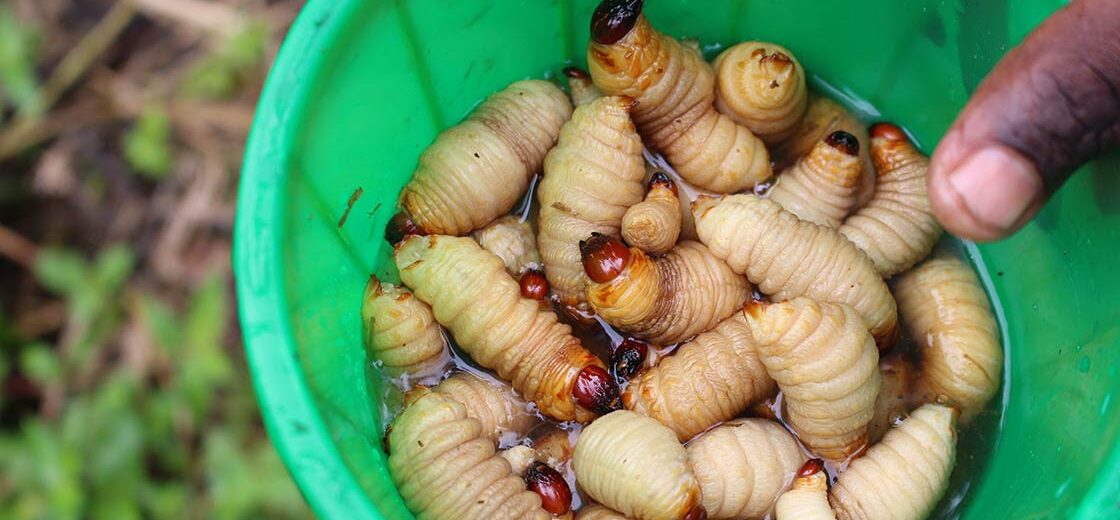Pioneering Insect Farming in Ghana’s Food Industry
Introducing Shobhita Soor
Shobhita Soor, a visionary Ghanaian entrepreneur, is reshaping Ghana’s food industry landscape through her innovative strategies and commitment to sustainability.
At the heart of Shobhita’s endeavours lies Legendary Foods, a pioneering venture she established in Kumasi, Ghana, aimed at revolutionizing protein production.
Mission and Goals
Legendary Foods’ primary mission revolves around providing year-round access to nutritious and delectable palm weevil larvae, offering an affordable and sustainable protein source to consumers.

Palm Weevil Larvae: A Nutritional Powerhouse
Nutritional Value of Palm Weevil Larvae
Palm weevil larvae emerge as a nutritional powerhouse, rich in essential nutrients like amino acids, vitamin B12, and iron, catering to diverse dietary needs.
Cultural Significance and Historical Consumption
Exploring the cultural heritage surrounding palm weevil larvae consumption unveils its historical importance and widespread culinary use across various cultures worldwide.
Akokono House: Diversifying Products and Offerings
In addition to spearheading Legendary Foods, Shobhita operates Akokono House, a culinary hub in Kumasi, renowned for its innovative insect-based delicacies.
Akokono House boasts a diverse menu featuring branded products such as cookies and pepper sauce, alongside tantalizing dishes like larvae stew and soup, showcasing the versatility of palm weevil larvae.
Shobhita’s Journey
Shobhita’s journey commenced with the co-founding of Aspire Food Group, a venture that garnered international acclaim for its impactful initiatives addressing global food security challenges.
Her notable achievements include winning the esteemed $1 million Hult Prize in 2013, a testament to her commitment to fostering positive social change through innovative business models.
Addressing Protein Accessibility in Ghana
Challenges with Protein Access in Rural Areas
Ghana, like many nations, grapples with the inequitable distribution of affordable protein sources, particularly in remote regions where access to traditional animal proteins remains limited.
Shobhita’s visionary approach emphasizes palm weevil larvae as a sustainable alternative to conventional animal proteins, offering a viable solution to enhance protein accessibility across Ghana.
Environmental Sustainability of Insect Farming
Benefits of Insect Farming Compared to Traditional Livestock Farming
Insect farming emerges as an environmentally sustainable practice, boasting lower resource requirements and reduced ecological footprint compared to conventional livestock farming methods.
Lower Environmental Impact and Resource Requirements
The ecological benefits of insect farming extend to its minimal resource usage and reduced greenhouse gas emissions, positioning it as a promising avenue for sustainable food production.

Shobhita Soor’s Impact and Legacy
Shobhita Soor’s indelible mark on Ghana’s food industry resonates through her relentless pursuit of sustainability and innovation, paving the way for a brighter, healthier future.
Future Outlook for Sustainable Food Production in Ghana
As Ghana embraces sustainable food production practices, Shobhita’s visionary leadership sets a precedent for future endeavours, heralding a paradigm shift towards a more equitable and environmentally conscious food ecosystem.
FAQs:
- How did Shobhita Soor venture into the food industry?
- What distinguishes palm weevil larvae as a sustainable protein source?
- How does Akokono House contribute to promoting insect-based cuisine?
- What accolades has Shobhita Soor received for her contributions to sustainability?
- What are the environmental advantages of insect farming compared to traditional livestock farming methods?




